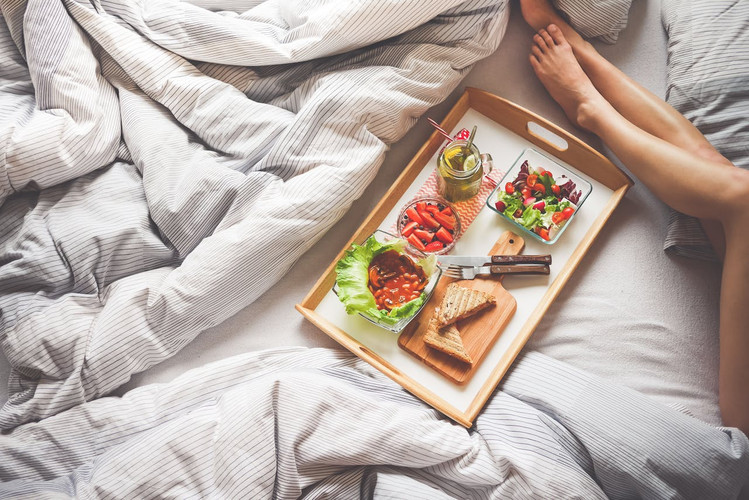What to Eat Before Bed: Food Guide
Published by Leafsleep on 15th Oct 2025
Knowing what to eat before bed is fundamental to ensuring a restful sleep. The choice of food at night directly influences digestion, relaxation and the production of hormones linked to rest, and can make all the difference to how well you sleep through the night.
Sleeping well doesn't just depend on a quality mattress or a peaceful environment in the bedroom - food plays an essential role. That's why understanding the best foods for sleeping well is an important step for anyone looking to get a good night's sleep.
When to have dinner to promote sleep?
Ideally, you should eat dinner 2-3 hours before going to bed.
This gives your body time to digest, reducing the risk of reflux or abdominal discomfort.
If you have to have dinner later, prefer light, easily digestible meals such as:
- Vegetable soup;
- Yogurt with oats;
- A piece of fruit accompanied by nuts.
These options help you get a good night's sleep without compromising your rest.
What to eat before bed?
For those who want to sleep well through the night, certain nutrients are real allies. Foods rich in tryptophan, magnesium, calcium and omega-3 promote the production of serotonin and melatonin, hormones that regulate the sleep cycle.
Best foods for a good night's sleep
- Oily fish (salmon, sardines, cod): rich in omega-3 and tryptophan;
- Banana: rich in magnesium and vitamin B6 - helps with muscle relaxation;
- Eggs and turkey: lean protein with tryptophan;
- Milk and dairy products (yogurt, cottage cheese): stimulate the production of melatonin;
- Spinach and green leafy vegetables: they provide magnesium, which is essential for relieving muscle tension;
- Nuts (almonds, walnuts, pistachios): great evening snacks when eaten in small quantities;
- Cherries and walnuts: natural sources of melatonin;
- Kiwi fruit: recent studies indicate that this food, when consumed in a balanced way, helps reduce the time it takes to fall asleep and improves the quality of sleep.
These foods can be great allies for those who want to sleep well all night.
Foods to avoid at dinner to sleep better
Some foods impair rest and should be avoided at night:
- Red and processed meats;
- Very spicy meals;
- Caffeine: coffee, black tea or soft drinks;
- Acidic fruits: orange, pineapple, kiwi when consumed in excess;
- Too many sweets and chocolate;
- Fried and fatty foods, which slow down digestion.
These foods can cause heartburn, restlessness or discomfort, making it difficult to rest at night.
Good practices for sleeping well
In addition to diet, there are a number of habits that promote rest, such as
- Maintain regular sleep schedules;
- Create a dark, quiet and comfortable environment;
- Avoid late and heavy meals;
- Opt for slowly absorbed foods;
- Hydrate yourself moderately before bed.
To find out more about the habits you should adopt or maintain in order to sleep well, explore our article on 5 Healthy Sleep Habits.
Knowing what to eat to get a good night's sleep is just as important as investing in the right environment or the ideal mattress. By choosing foods that are light, nutritious and rich in tryptophan and magnesium, you'll contribute to more restful nights and deep rest.
At Leafsleep, we believe that restful sleep comes from small daily habits, but also from choosing quality mattresses, pillows and comforters. By combining a balanced diet with the best sleep materials, you'll discover how to sleep well all night long.

